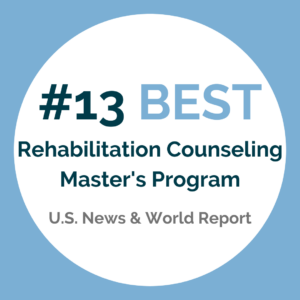About Us

Our division offers two unique and challenging master’s degrees:
- The Master of Science in Clinical Rehabilitation Counseling degree requires 68 credits within the major
- The Master of Science in Clinical Mental Health Counseling degree requires 65 credit hours within the major
The programs offer exceptional training in two entry-level specialty areas of counseling: Clinical Rehabilitation Counseling and Clinical Mental Health Counseling. Graduates are highly qualified to provide counseling services to individuals with mental and emotional disorders, co-occurring conditions, and a variety of chronic illnesses and disabilities. Graduates of the program will be prepared to effectively use a variety of counseling interventions to improve the lives of individuals with a broad range of mental health issues or other needs resulting from a disability or chronic health conditions.
The programs are fully accredited by the Council on Accreditation of Counseling and Related Educational Programs (CACREP).
Both MS in CRC and MS in CMHC graduates will be eligible for national credentials available for professional counselors. Graduates can pursue the Certified Rehabilitation Counselor (CRC) and the National Certified Counselor (NCC) credentials. In addition, graduates meet educational requirements for licensure in the majority of states.
Clinical Rehabilitation Counseling
Clinical Mental Health Counseling
The mission of the Division of Clinical Rehabilitation and Mental Health Counseling (the “Division”) is to serve the people of North Carolina by educating clinical rehabilitation counselors (“CRCs”) and clinical mental health counselors (“CMHCs”) with the knowledge and expertise to serve the state’s citizens with mental, behavioral, or neurodevelopmental disorders with an emphasis on those citizens who have psychiatric and/or developmental disabilities. The mission is based on the fundamental belief in the dignity and worth of all people, and in the rights of people with disabilities to live self-determined lives in inclusive communities of their choice. The CRCs and CMHCs will use the counseling relationship and their skills to work collaboratively with individuals to: (i) maximize functional capacity, productive and independent living skills, and quality of life; (ii) provide access to culturally sensitive and evidence-based counseling practices; and (iii) manage personalized services to support the unique needs and preferences of each individual, their family, and community. Fundamental to this effort is a focus on the whole person—their psychological, vocational, spiritual, and physical aspects—as well as family, social, work, and community relationships. Furthermore, The Division is dedicated to inclusive practices, appreciating diversity, reducing health disparities, and serving marginalized and under-represented communities. The Division seeks to educate CRCs and CMHCs who possess the knowledge, skills and personal and professional qualities required to forge new models of community practice that address the diverse needs of individuals with disabilities now and in the future. In carrying out this mission, the faculty of the Division has the obligation to acquire, discover, preserve, synthesize, and transmit knowledge, to serve as models of professional leadership, and to create a culture of educational excellence that will nurture students’ intellectual and ethical development. Students have the responsibility to fully engage in an educational process of research, free inquiry, and personal responsibility and to become foremost practitioners, scholars, researchers, and leaders in the professions of clinical rehabilitation counseling and mental health counseling. The University of North Carolina at Chapel Hill is recognized, nationally and internationally, as a leading center of scholarship, research, and creative work with a mission to serve the people of North Carolina and the nation. The mission of the Division is to contribute actively and substantively to this tradition. The University of North Carolina at Chapel Hill is committed to equality of educational opportunity. The University does not discriminate in offering access to its educational programs and activities on the basis of race, color, gender, age, national origin, religion, creed, disability, veteran’s status, sexual orientation, gender identity or gender expression. The Dean of Students (919) 966-4042 has been designated to handle inquiries regarding the University’s non-discrimination policies.Mission of the Division